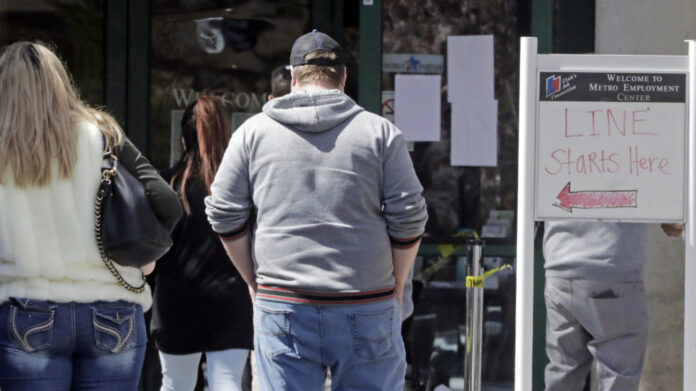
A budget working group is recommending that the state issue $1.9 billion in bonds to replenish the dwindling funds through which they pay out unemployment benefits.
State Sen. Juan “Chuy” Hinojosa said the work group made the recommendation to Gov. Greg Abbott’s office last week as an alternative to obtaining more funds through what’s called a Title XII loan from the federal government.
“The recommendation’s already been done to go the bond route and this will have to be done like this month,” said Hinojosa, D-McAllen.
Unemployment benefits are paid out through the state’s unemployment insurance compensation trust fund, but the state started drawing funds from the federal government in June.
The Texas Workforce Commission submitted a Title XII advance request to the U.S. Secretary of Labor on April 14, according to Cisco Gamez, a spokesperson for the Texas Workforce Commission.
Such a request must be submitted in order to apply for repayable advances and the state requested the authority to borrow $1.8 billion in May, $2.6 billion in June and $2 billion in July.
However, TWC didn’t borrow funds until June 9 and Gamez stated that funds are drawn daily to cover UI payments when it becomes necessary.
Since then, the agency has drawn $1.49 billion in Title XII advances.
“Texas has always been able to meet the unemployment needs of unemployed Texans,” Gamez stated. “In fact, we have always been able to provide a payment to an eligible individual.”
He noted that unemployment benefit payments will continue without delay or interruption regardless of when Title XII advances are needed.
Those advances, he added, are interest-free until December.
But if the state does not pay back those loans in time to avoid accruing interest rates, Hinojosa said employers would likely face higher taxes.
“We have to recoup that from employers and if we don’t, then the federal government itself will order a tax on employers and recoup those funds,” Hinojosa said Tuesday. “So the short period of time doesn’t allow us time for employers to get back on their feet and then, quite frankly, will go out of business. And those who come back and open their businesses (will do so) under a lot of financial pressure to be able to pay an additional employer tax to pay back the funding for unemployment benefits.”
To avoid that, Hinojosa said the working group recommended issuing bonds for $1.9 billion, an amount that’s been projected to be needed to cover the unemployment insurance fund for the rest of the year.
That option, he said, would allow the state to pay back the money at a lower interest rate and over a longer period of time, likely three to four years.
“(It) would give our employers a lot more time to recover, and the state,” Hinojosa said.
The working group includes Sen. Jane Nelson and Hinojosa, chair and vice chair of the Senate Finance Committee, respectively.
On the House side, it includes Rep. Giovanni Capriglione and Oscar Longoria, chair and vice chair of the House Appropriations Committee, respectively.
They’re joined by staff from Abbott, Lt. Gov. Dan Patrick, House Speaker Dennis Bonnen and the Texas Workforce Commission.
“Usually what we’ll do is we’ll discuss,” said Longoria, D-Mission. “We think of some ideas and then we’ll look at it and then vet it and re-look at the issue and see if that’s going to be the best recommendation to go forward with.”
He said it’s still unclear whether that is the route the state will ultimately take but said many on the committee seemed very receptive to the idea.
“So yes, that was discussed last week,” he said. “Of course, we want to make sure we keep up with our TWC claims and then we understand the situation that, you know, the claims process is basically depleting our funds so we’re looking at ways to address that.”
The legislative budget board, another group that Longoria is involved with that encompasses House and Senate members, is scheduled for a committee hearing at the end of the month to get an estimate from the state comptroller on the state’s financial status.
Abbott would have the final say-so on whether to go the bond route, Hinojosa said, but TWC would have to adopt a resolution in order for the state to go through with the bond issuance, according to Gamez.
“The Commission is required to adopt a resolution in which a determination is made regarding whether the issuance of bonds will result in a savings to the state and to employers as compared to the cost of borrowing or obtaining an advance,” Gamez stated. “Any such resolution would also include the bond authorization amount being requested by the Commission.”
There currently isn’t a date scheduled for TWC to consider a resolution for the issuance of bonds.
TWC last issued bonds in November and December 2010.




